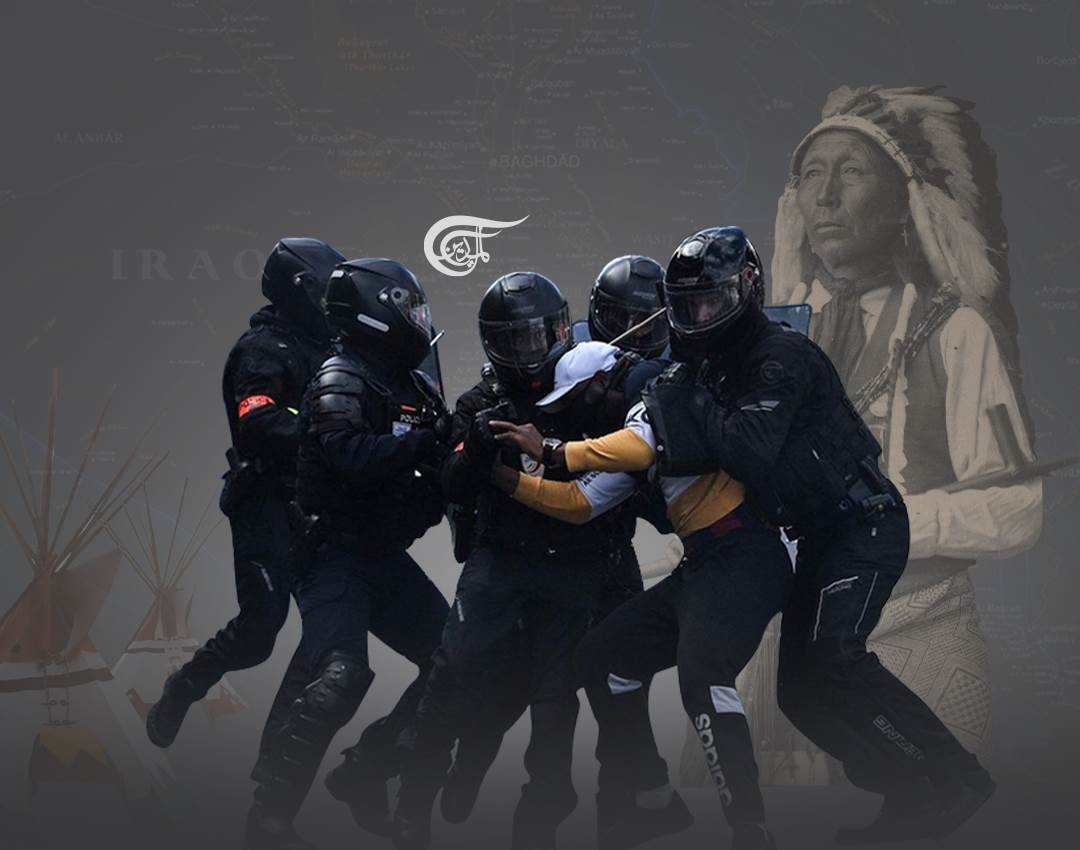The Way Forward, Part I
Families of the victims of systemic racist police violence against people of African descent in the US react by keeping with the traditions of the extraordinary leadership of the Civil Rights movement.
-

US racism; from annihilation to slavery to the present-day police brutality
The stoicism, patience, persistence, and courage of families of the victims of systemic racist police violence against people of African descent in the United States and of American attorneys representing them against all odds and the adversity and obstacles of the policing and justice system, is in keeping with the traditions of the extraordinary leadership of the Civil Rights movement and of other political struggles of people of African descent in the United States. These people found time and energy even at the height of their struggle against segregation and an unjust racist system to oppose ‘Militarism’ which they believed had become central to the economic and cultural dominance of the United States. This will be resulting directly in the perpetuation of racism at home and abroad and in abysmal conditions of poverty among a large section of people within the United States of all races, in particular of the people of African descent. It is this endemic racism within the United States which dictated the attitude of US soldiers and officers who referred to Iraqi citizens as “Sand Niggers”, following United States aggression, brutal bombing, and occupation of Iraq in 2003, and for years thereafter.
It was the opposition of outstanding leaders of African descent in the United States of America to institutionalized militarism and war as an extension of US racism abroad that was lending a hand to the oppressed of other continents, including to Asia at the height of the Vietnam war, which had led directly to the assassination of Dr. Luther King Jr.
Some of us heard the unforgettable words of Dr. Martin Luther King (Jr) in his Riverside Church address, titled ‘Beyond Vietnam'. From this stirring address of Dr. King we discovered that there was another United States of America, more like us in Africa, Asia, South America, and the Caribbean, and like the Aborigines and Maoris whose countries were seized. We understood that apart from ‘settler colonialism’ of other countries, there is internal colonialism within our societies, of which the Indigenous people of the Americas, the Native Americans in the United States, and the people of African descent brought to the shores of the Americas in chains, were the main victims, though there are others around the world.
From the outset of the Plantation, slave economies of the British Companies and Corporations established in the Caribbean, and in colonies in the United States of America and by some other European powers, targeted those whose labor was to be stolen to exploit the lands they had seized in the Americas. Trade in human beings, as well as free and cheap labor, dictated the policy of the European slave trade, and later the Immigration Policy of the United States of America. Waves upon waves of poor immigrants were targeted for their cheapest labor; a policy which continues till date, apart from the brain drain of professionals from across continents. This is related to the origin and economic history of the United States as a British Plantation Company Incorporated.
Did the United States have the financial means to rectify the social and economic inequality, which was the legacy of the genocide of the Native Americans referred to as “Red Indians", by taking over their lands and country, and of the slavery of African descent people in the United States? As early as 1967, just a few years before the 1971 decision to move the dollar off the gold standard and at the height of the Vietnam war, which began the slow yet steady decline of the dollar as the reserve currency, propped up thereafter for many decades by the petrodollar, Dr. Martin Luther King Jr., the eminent US Civil Rights leader, observed:
“A nation that continues year after year to spend more money on military defense than on programs of social uplift is approaching spiritual death.”
In this context, it is worth noting that at a time the United States is the largest exporter of arms, my country India emerged as a leading arms importer.
No land, resources, or any kind of economic support were ever provided to the minuscule percentage of Native Americans or Indigenous people of the Americas who survived genocide, or to the former slaves of African descent to rise above levels of subsistence. This was the case although land was being distributed to European Immigrants within the United States of America, in the territories known as the ‘ Wild West’ among other regions of the United States. This land belonged to the Indigenous Native Americans.
Fast forward... despite the abolition of slavery, it still continued in new forms, such as the supply of the so-called convict labor of people of African descent to plantations and farms in the South, the precursor of the later 'Prison Industrial complex’, and the supply of cheap prison labor to US Companies. The United States has the largest prison population in the world.
The Civil Rights Act of 1861 was never implemented even after the Civil War broke out between the Northern and Southern states of the United States of America based on different economic systems, broadly the Industrial North and the Slave Plantation economies of the South; with different economic interests and international alliances. A new Civil Rights program had to be enacted a century later to end racial segregation in the United States, as a direct consequence of the 1960s Civil Rights struggle of people of African descent.
Until 1967, people of African descent in many cities and towns in the US Southern states were legally prohibited from entering any other area where other races resided, from sundown till morning, except where their own community resided in ghettos. These cities and towns were known as ‘Sundown’ cities. Public lynching of African Americans continued well into the 20th century in the US Southern states, with congressmen and senators expressing sympathy to the Ku Klux Klan and vigilante secret militia squads raping black women and torturing and killing African Americans. These congressmen and senators were politically respectable in both the Republican and Democratic parties until a decade ago. Racism in the United States historically and today, as per expert witnesses, is a useful political and economic tool for both parties, Republican and Democratic, to fragment the society and divide middle-income and working people in the United States, preventing them from uniting on national economic and political issues of priority concern.
We, in Asia, are aware of the discriminatory and racist treatment meted out to Asian labor in the United States, despite the historical amnesia from all sides. Chinese and Indian labor from the Punjab, working on the extensive infrastructure of US railroads, were brutally treated, and there were killings too. A law against Asian Immigration was passed after the excruciating heavy work on the railroads was completed. Interracial marriages between White races and Asian races were also prohibited, just as the marriages between Whites and Blacks. Japanese citizens of the United States were rounded up and interred in camps during World War II; though many Japanese Americans had volunteered and served in the US Army in the European Sector in the war.
Laws enacted in the United States against interracial marriages and segregation laws were enforced in all states of the USA. Eugenic experiments funded by US Corporate Foundations on African Americans and other races were later transferred by some of the well-known Corporate foundations to Scientific Institutes in Nazi Germany including the Kaiser Wilhelm Scientific Institute; evidence that racial laws enacted and adopted by fascist governments in Europe, originated in the political culture of Slave Plantation Company economies established by the British in the Caribbean and in the North American colonies, and were carried forward to the United States.
We in India are painfully aware that apart from the slavery of people of African descent, another form of bonded labor invented by British Companies was the indentured labor system of the poor and indebted peasantry in British Colonial India forced into bonded labor by debt and carried off to work as bonded indentured labor in sugar and other plantations in South Africa and in several other countries, including islands in the Indian Ocean, in the Pacific, and in the Caribbean.
Not surprisingly as basic a bill as the ‘Breathe Act’ to ensure minimal protection and constitutional policing within the United States against violent, brutal, and discriminatory racial policing, though passed by the House of Representatives, was rejected recently by the Senate in September 2021 and has become politically deadlocked, reinforcing the point of view that race is being used not to resolve issues, but to deliberately fragment the unity of the people in the United States to keep racial issues simmering so as to prevent unity on vital economic and political issues.
The massive protest movements across the United States before the last elections predominantly of people of African descent were not confined only to African American communities and included citizens of other racial groups, who oppose the militarization of the US police force. This indicates that there is a movement for change. In this context, it is necessary to recall that Dr. Martin Luther King Jr. did not believe that “rioting can change anything." Acts of extreme violence are also carried out by agent provocateurs who infiltrate organized movements so that the latter can be condemned and dispersed with violent police or military action. As per the US disciple of Mahatma Gandhi, Dr. Martin Luther King Jr. believed that sustained organization and orderly mass mobilization with the active participation of the citizenry was necessary to change and transform society, though he did concede that “riots sometimes express the voice of the unheard.”
There comes a time in the life of every nation when it is no longer able to continue in the old ways. In such a situation, the only way forward is to honestly appraise the past and the present; to rid oneself of political myths and illusions that are not based on the ground realities, to review the functioning of all political organizations and all institutions of the state, to lift the ‘veil of democracy,' which we in the United States and in my country India use to conceal our history and the injustices of our present, by referring to our political systems as the ‘world’s largest democracies.' However, this self-praise is not supported today by our social, economic, and political realities and institutions. If we cannot continue in our old ways, we must change. As we prepare ourselves for change, it is necessary to confront the truth and to widely propagate it. The unanimous report of 12 Commissioners of the US International Commission of Inquiry into Systemic Racist Police Violence Against People of African Descent, of which I was a commissioner, is a search for the truth and is of vital concern to the citizens of the United States of all races. In certain aspects, this report constitutes a touchstone aimed at assessing the form and content of US Democracy.

 Niloufer Bhagwat
Niloufer Bhagwat
 10 Min Read
10 Min Read











